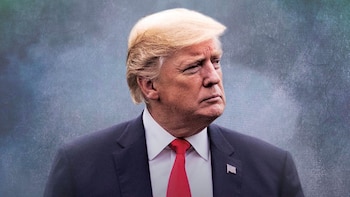
President Donald Trump will play the role of a dutiful diplomat at a global economic summit this weekend, his schedule jammed with one-on-one meetings with allies including Germany, India, Japan and South Korea as well as the authoritarian leaders of Russia, China and Turkey.
If past is prologue, he does not look forward to the task.
The president generally dislikes group chatfests such as the annual Group of 20 economic meeting that begins Friday. His mood in the weeks leading up to the gathering in Argentina was not helped by Republican losses in the midterms, potential signs of trouble in the U.S. economy and the special counsel's Russia investigation.
The session also comes amid brewing trade spats, a volatile confrontation between Russia and U.S. ally Ukraine, the fallout from the killing of Washington Post contributing columnist Jamal Khashoggi and fast-moving events surrounding Britain's divorce from the European Union.
Trump aides wanted to avoid a repeat of the smaller Group of Seven in June, which Trump pushed wildly off the rails. He lectured longtime allies on trade, issued threats and pulled his name from a painstakingly negotiated joint statement.
This time, White House officials reached out to key allies and downplayed expectations that Trump would hold bilateral meetings with major European and Asian counterparts, according to diplomats with knowledge of the interactions.
Until Tuesday, Trump's only announced meetings were with Russian President Vladimir Putin and Chinese President Xi Jinping.
"We were steered toward not asking for a bilateral, with the rationale being that he hates multilateral meetings, so do yourself a favor or it will be the G-7 all over again," said one diplomat familiar with pre-summit planning.
As a result, officials from Canada, France, South Korea and Britain expected that no formal bilateral meeting with their leaders and Trump would materialize in Buenos Aires.
So it was a surprise this week when White House press secretary Sarah Sanders and national security adviser John Bolton detailed Trump's busy agenda, which includes the first joint meeting with Japanese Prime Minister Shinzo Abe and Indian Prime Minister Narendra Modi.
"We're trying to fill every minute of the president's schedule," Bolton told reporters Tuesday.
Trump will see eight leaders, including a customary meeting with this year's host, Argentine President Mauricio Macri. He'll see others briefly in the course of two days of economic sessions, lunches, dinners and a "cultural event."
As key allies continued to press for a meeting with the president, the White House switched course and opened the door to more bilaterals, including meetings with Abe, German Chancellor Angela Merkel and South Korean President Moon Jae-in.
On paper, the unconventional U.S. leader – who snagged the G-7 and a NATO meeting this year while appearing to sulk on his most recent international trip to Paris – is suddenly doing the kind of diplomatic box-checking that his recent predecessors have done at such summits.
True, Trump is skipping private time with the leaders of France, Britain and Canada, all of whom he has recently antagonized. And his 45-minute session with Merkel, which came together hastily this week, is likely to include testy discussions about looming auto tariffs and Germany's purchase of Russian natural gas.
"They'd been consistent in their messaging for the past two weeks, telling everyone that the G-20 is important in and of itself, and we don't want bilateral meetings to take away from it," another diplomat said.
Expectations are low for most of those conventional meetings on the sidelines.
"The pessimists in the delegation say the best we can hope for is there is not another disaster after the G-7 and the NATO summit, so if things don't get worse it's already a success," one European diplomat said.
The European wish list for the summit is short, the diplomat said: Calm markets nervous about a U.S.-China trade war, and avoid another round of tariffs against Europe and China.
Those outcomes do not depend on individual meetings with Trump, and skipping them might help, said Uzra Zeya, a former top State Department diplomat.
"For the Europeans, at least, the cost of a meeting that fails to produce results or is followed by nullification – it's certainly questionable what the gain is," said Zeya, now a senior fellow at the Center for American Progress.
Trump's sessions with Putin and Xi overshadow his other diplomatic business over two days in Argentina. Putin escalated a military contest with Ukraine this week, and Trump has picked a trade fight with China that could worsen if his dinner meeting with Xi goes badly.
White House economic adviser Larry Kudlow told reporters that Trump sees a "good possibility" of a preliminary accord with China. "He's open to it," Kudlow said.
Trump has imposed tariffs on $250 billion in Chinese products, supported new limits on Chinese investment in the United States and moved to restrict exports to China that involve advanced technologies.
"China doesn't need to be reminded of what is at stake," said Alan Wheatley, a global economic analyst at the British think tank Chatham House. "But they have been badly blindsided by Trump," whose business background and transactional view of foreign policy had appealed to Beijing. "Their reading of him – and of course they're not alone – has been wrong."
Bolton gave only a cursory preview of the agenda with Putin – primarily arms control and security issues.
In an interview with The Washington Post on Tuesday, Trump threatened to cancel the Putin meeting over the confrontation with Ukraine, a move that would answer critics who argue that a private one-on-one would reward Putin for provocations.
"I don't like that aggression," Trump said. "I don't want that aggression at all. Absolutely. And by the way, Europe shouldn't like that aggression."
But the meeting was still on as of Wednesday, and the Kremlin said Putin is planning on it.
"The President is receiving regular briefings on the Russia/Ukraine situation from his national security team, including briefings Monday, Tuesday afternoon and again today," Sanders said in a statement to The Post on Wednesday. "We will keep you posted when there is additional public information or any policy announcements on this matter."
Turkish President Recep Tayyip Erdogan is likely to take Trump to task over the death of Khashoggi inside the Turkish Consulate in Istanbul. Trump last week said that regardless of whether Saudi Crown Prince Mohammed bin Salman orchestrated the U.S. resident's killing, the U.S.-Saudi relationship was too important to breach. Erdogan has criticized Saudi rulers, and his government has drip-fed incriminating details about the case for weeks.
In the Post interview, Trump said he remains open to a meeting in Argentina with MBS, as Saudi Arabia's embattled crown prince is known, although no such session is scheduled.
While the additional bilaterals may stoke fears of a G-7 repeat, other dynamics will be different, including the presence of new populist and right-wing leaders more aligned with Trump's worldview.
At the smaller G-7 meeting in June, Trump felt encircled by center and center-left politicians who challenged him on trade and the environment. In Buenos Aires, he will be joined by more like-minded leaders, including Argentina's Macri, Brazilian President Jair Bolsonaro and Italian President Sergio Mattarella, as well as Putin, whose exclusion from the G-7 Trump protested.
Russia was disinvited from the influential club of industrial economies over the 2014 annexation of Crimea from Ukraine. The maritime seizures on Sunday occurred off the coast of Crimea, and Ukrainian President Petro Poroshenko is warning of all-out war. Putin said Wednesday that the incident was staged.
"The room is slightly more friendly for Trump," one diplomat said.
More friendly, perhaps, but also wary of Trump's unpredictability and taste for drama.
"There's been a very clear decision, actually, particularly by European leaders, that the problems that emerged with the Trump administration are disproportionately when the president is involved or in the room," said Brookings Institution foreign policy analyst Thomas Wright.
The Washington Post's Josh Dawsey and Philip Rucker contributed to this report.
The Washington Post
Últimas Noticias
¿Cuál fue la última voluntad de la cantante Dulce antes de morir?

Metro CDMX y Metrobús este 25 de diciembre: activan marcha lenta en Líneas 3, 8, 9, 12 y A

Remedios caseros para el guayabo: platos “levanta muertos” que alivian los síntomas después de las fiestas decembrinas

Miguel de Narváez: la mente tras los jingles más famosos que se escuchan en Colombia

Las películas favoritas del público en Prime Video México




